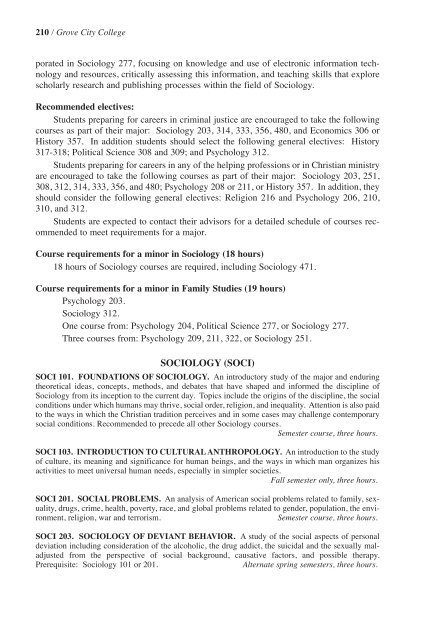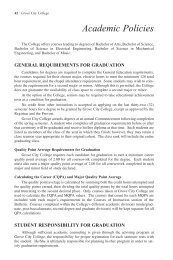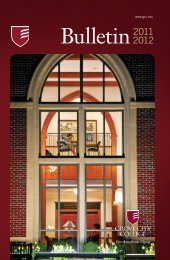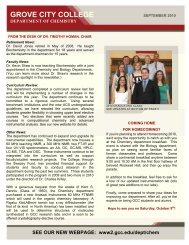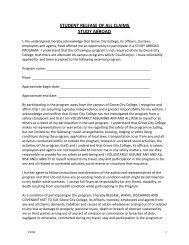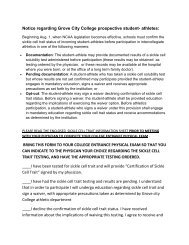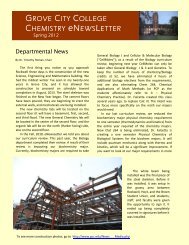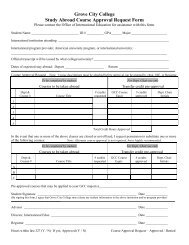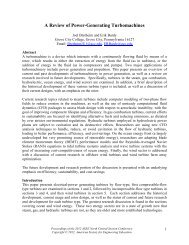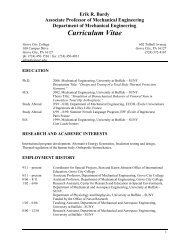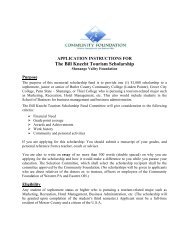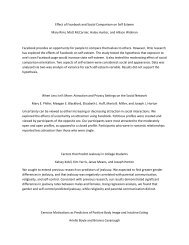2009–2010 - Grove City College
2009–2010 - Grove City College
2009–2010 - Grove City College
You also want an ePaper? Increase the reach of your titles
YUMPU automatically turns print PDFs into web optimized ePapers that Google loves.
210 / <strong>Grove</strong> <strong>City</strong> <strong>College</strong><br />
porated in Sociology 277, focusing on knowledge and use of electronic information technology<br />
and resources, critically assessing this information, and teaching skills that explore<br />
scholarly research and publishing processes within the field of Sociology.<br />
Recommended electives:<br />
Students preparing for careers in criminal justice are encouraged to take the following<br />
courses as part of their major: Sociology 203, 314, 333, 356, 480, and Economics 306 or<br />
History 357. In addition students should select the following general electives: History<br />
317-318; Political Science 308 and 309; and Psychology 312.<br />
Students preparing for careers in any of the helping professions or in Christian ministry<br />
are encouraged to take the following courses as part of their major: Sociology 203, 251,<br />
308, 312, 314, 333, 356, and 480; Psychology 208 or 211, or History 357. In addition, they<br />
should consider the following general electives: Religion 216 and Psychology 206, 210,<br />
310, and 312.<br />
Students are expected to contact their advisors for a detailed schedule of courses recommended<br />
to meet requirements for a major.<br />
Course requirements for a minor in Sociology (18 hours)<br />
18 hours of Sociology courses are required, including Sociology 471.<br />
Course requirements for a minor in Family Studies (19 hours)<br />
Psychology 203.<br />
Sociology 312.<br />
One course from: Psychology 204, Political Science 277, or Sociology 277.<br />
Three courses from: Psychology 209, 211, 322, or Sociology 251.<br />
SOCIOLOGY (SOCI)<br />
SOCI 101. FOUNDATIONS OF SOCIOLOGY. An introductory study of the major and enduring<br />
theoretical ideas, concepts, methods, and debates that have shaped and informed the discipline of<br />
Sociology from its inception to the current day. Topics include the origins of the discipline, the social<br />
conditions under which humans may thrive, social order, religion, and inequality. Attention is also paid<br />
to the ways in which the Christian tradition perceives and in some cases may challenge contemporary<br />
social conditions. Recommended to precede all other Sociology courses.<br />
Semester course, three hours.<br />
SOCI 103. INTRODUCTION TO CULTURAL ANTHROPOLOGY. An introduction to the study<br />
of culture, its meaning and significance for human beings, and the ways in which man organizes his<br />
activities to meet universal human needs, especially in simpler societies.<br />
Fall semester only, three hours.<br />
SOCI 201. SOCIAL PROBLEMS. An analysis of American social problems related to family, sexuality,<br />
drugs, crime, health, poverty, race, and global problems related to gender, population, the environment,<br />
religion, war and terrorism. Semester course, three hours.<br />
SOCI 203. SOCIOLOGY OF DEVIANT BEHAVIOR. A study of the social aspects of personal<br />
deviation including consideration of the alcoholic, the drug addict, the suicidal and the sexually maladjusted<br />
from the perspective of social background, causative factors, and possible therapy.<br />
Prerequisite: Sociology 101 or 201. Alternate spring semesters, three hours.


